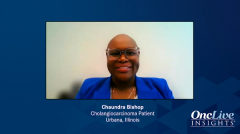
Clinical Presentations of Patients With Cholangiocarcinoma
Key opinion leaders illustrate how patients with intrahepatic cholangiocarcinoma present in a clinical setting.
Episodes in this series

This page is funded by Taiho Oncology, Inc. The faculty and publisher are solely responsible for this content. Taiho does not recommend or endorse the use of its products other than as described in the approved labeling. The content of this page is not medical advice and does not replace independent medical judgment.
This is a video synopsis/summary of a OncLive Insights involving Lipika Goyal, MD; Chaundra Bishop; R. Katie Kelley, MD; and Caroline Kuhlman, NP.
Chandra Bishop, a patient with cholangiocarcinoma, shares her diagnostic story. At her annual exam in summer 2016 at age 29, labs found elevated liver enzymes aspartate aminotransferase (AST) and alanine aminotransferase (ALT). Repeat testing showed further increases. Ultrasound identified a liver mass, presumed benign given her age and health. However, biopsy revealed malignancy. Chandra was asymptomatic aside from isolated lab abnormalities. She began chemotherapy with carboplatin and gemcitabine, continuing until May 2017 when resection removed the tumor, gallbladder, and 60% of her liver with clear margins. She then had 6 months of adjuvant capecitabine and gemcitabine. Though initially presumed cured, nodules ultimately appeared in her lungs, multiplying despite radiation, cisplatin, oxaliplatin, and trials. Molecular profiling found a FGFR2 mutation, guiding ongoing experimental therapeutics.
In discussion, Caroline Kuhlman, NP, notes jaundice as the most common initial presentation of cholangiocarcinoma - yellowed skin/eyes, intense itching, light stools, dark urine, right upper quadrant pain, weight loss, fevers, and fatigue. Abnormal liver function tests typically prompt imaging studies revealing obstructed bile ducts. Symptoms can seem vague initially – fatigue, pain, bloating, constipation, anorexia – often delaying diagnosis until advanced disease. Cholangiocarcinoma tends to spread widely through biliary channels before detection, making resection difficult. Still, as Chandra’s case demonstrates, chemotherapy and surgery can sometimes cure intrahepatic cholangiocarcinoma despite lack of early screening tools, especially if the tumor is amenable to shrinkage with systemic treatment. Ongoing trials explore molecularly targeted therapies based on genetic profiling to improve outcomes when surgery is impossible.
The panel emphasizes the need for research focused on developing evidence-based guidelines around screening extrahepatic cholangiocarcinoma in patient subgroups at elevated risk, though consideration of how to monitor high-risk members of families with hereditary cancer predisposition already warrants discussion between providers and patients. Better understanding of genetic and environmental disease causes could aid prevention efforts as well. As cholangiocarcinoma incidence rises globally, multidisciplinary awareness and collaboration focused on early detection and advanced treatment remain imperative to reduce mortality from this insidious cancer spreading through the biliary system often evading diagnosis until late stages when few options exist. Still, Chandra’s case provides reason for hope that a fraction of patients with cholangiocarcinoma can survive and thrive in long-term remission, especially young and otherwise healthy patients able to tolerate aggressive therapy.
*Video synopsis is AI-generated and reviewed by OncLive® editorial staff.







































